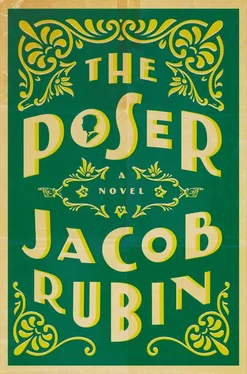I wanted a story like the doctor’s, one driven by its end, but mine resembled more the first blabberings of a child, when the impulse to speak trumps any ability to do so. My experiences were in a terrible knot, and we depended on the wayward, but thorough, logic of association to untangle them. Often we worked backward, starting, say, with my malfeasance in Fantasma Falls, which led to the sight of Lucy and Bernard backstage, which led, in turn, to my failure to imitate Lucy, which recalled, in the following order, my journey to the City; my encounter with Max; my politeness at the station; my fondness for Mr. Heedling; and last, always, to Mama.
Certain phrases in particular caught his attention. “Sympathetic to the bone,” for one.
“Do you feel that you are?” he asked.
“I don’t think so, no.”
“Why not?”
“I’ll explain this way: We used to do an act onstage. Two family members would come up. A mother and son, say. Max would lead the son and me behind a screen at the side of the stage, then the two of us — the volunteer and I — would go backstage for a second and come up with a little speech, one that used the names of the child’s parents or some personal details that couldn’t be faked. Then we’d hide behind the screen again and deliver our speeches, one at a time, so the mother would have to guess which of us was which. Usually the mothers (and the husbands, and the wives, and the children, for we did all types) were dead certain they could pick their son’s voice. ‘The second one,’ they’d say. ‘I’d know my Jimmy anywhere.’ Lo and behold, after a tense silence, I’d come out from behind the screen. ‘Hi, Mommy!’ I’d say, and the audience would applaud and this mother, who a moment ago in her heart of hearts knew that I was her son, would stare at me, this huckster in a tuxedo — and how did she react? This is why I bring it up. How do you think someone would greet such a surprise?”
“She was happy.”
“Have you ever seen a person embarrassed by their own good fortune, a person mortified by luck? That’s how it was. These mothers didn’t know what to do with their hands. They blushed, hugged me. The men grabbed my shoulder, they pumped my hand. Many times this happened, and yet every time I stepped out from behind the screen, I secretly flinched, sure that the family would see what a charlatan I was, that the audience would join, and I would be stoned.”
“That seems extreme,” he said.
“The stage, Doctor, knows only extremes.”
“Why a charlatan, though? Were you cheating them? Would you pretend to have produced a voice you hadn’t?”
“Not at all. Sometimes they did guess right, and that was notable, too, for how disappointed the mother or father always was.”
“Why a charlatan then?” he asked again.
“Because they thought I was doing something I wasn’t. Why else would they react that way?”
“You interpreted their interest in your act as a belief that you were ‘sympathetic to the bone.’”
“I suppose so.”
“Were you? When you performed your stage act were you being ‘sympathetic to the bone’?”
“No. That’s what I mean. I knew I wasn’t, but I hoped I was.”
“How did you know you weren’t?”
“Because I was so relieved when each volunteer stepped off the stage. After they’d thanked me — hugged me, patted me, shook me — after the applause had died, the volunteer walked down the stairs back into the audience, and a new volunteer emerged, and I was thankful. Because each one — they wanted to talk and share secrets, or do whatever people do to ‘get to know each other,’ and each, if they didn’t have to return to the audience, would have discovered what a fraud I was.”
“Fraud, charlatan, huckster. Why? You did exactly what you purported to do: you exhibited a skill and they appreciated it.”
“But they believed an insight attended that skill, and it didn’t.”
“But how do you know that?”
“I appreciate it, Doctor, and I suppose it was thrilling to be imitated, but what I was doing, you see, it concerned the outside of a person. They thought I’d touched the inside .”
“To the bone.”
“Precisely.”
“But is there no place where the outside and inside meet?”
“Not that I know of.”
“But I think you do,” he said. “One of your peculiar phrases. The loose seam that sticks out and, when pulled, unravels a person.”
“The thread.”
“Let me ask,” he said. “Why does one pull it?”
“How do you mean?”
“Why must one — must you —pull on it? Couldn’t one observe a loose seam without tugging it?”
“I don’t know. I suppose it’s a malicious act — or it can be — to unravel a person. As a child, it was pure impulse. I couldn’t help it. I was impatient.”
“Impatient with what?” he asked.
“The theater of things, maybe. I think that was what my politeness was about — my being so polite when I worked at the train station. I was participating in a theater—‘Hello, ma’am,’ ‘A good day to you, sir.’ All that false gloss on life. What Bernard called the ‘show.’ I was entering it.”
“It reminds me of the thought you had when you first mimicked Maximilian: that everyone around you was an imitator, too.”
“Perhaps. The world was crowded with impressionists, so, I suppose, one had to pull their threads and find out who everyone really was.”
“There’s another word for that,” he said. “A projection.”
“Not my favorite word.”
“Perhaps the hiding and acting that you ascribed to others was actually your own.”
“Perhaps,” I said.
“Which begs the question: If you were projecting your own feelings onto others, and as a result pulling those people’s threads — well, did you ever wish for someone to pull your thread?”
“Perhaps.”
“I believe we’re hitting on something.”
“Why’s that?”
“Whenever we hit on something, you say, ‘Perhaps.’”
“Perhaps,” I said.
“Let me then repeat the reporter’s question. The one he asked you that night, for it’s an important one, I think: What is your thread, Giovanni?”
“Mine?”
“If someone wanted to impersonate you, how would he?”
“I don’t know. I’ve certainly never been imitated, but I suppose you mean it more abstractly than that…. When I discovered Lucy with Bernard, that maybe was close to it.”
“The moment of betrayal.”
“Yes. It felt like something had been revealed. Like something inside me had been pulled out.”
“When else?”
“This is strange. It just occurred to me.”
“What?”
“When I wrote those letters to my mother, when she wrote hers to me. The writing — I never described or thought of it so — but it felt like that. On the page, I was free to pretend to be myself. To pay out my thread, if that makes sense.”
“Opposite experiences, it seems to me, and like all opposites, quite similar.”
“I don’t catch your meaning.”
“The two you mentioned,” he said. “Writing. And betrayal.”
• • •
Flooded as I was by the desire to reveal, I had to dam up at times and withhold certain close gems of facts and feeling. Most of all I had to maintain the ruse that I was not impersonating the doctor. This, of all my jeweled secrets, was the one I could not give away. An easy illusion to maintain, it turned out, since Orphels was too engaged in my story to detect the voice with which I told it. Each day he stared into his own wounded eyes, each day listened to his own overenunciated voice, and each day failed to notice. The differences between us were those of dress (he in his jeans and flannel shirts, I in my scrubs), hairstyle (his slick and parted down the middle, mine a cauliflower of black), and facial hair (he clean-shaven, I messily bearded). Early on I hunted around No More Walls for pomade, locating some eventually on a gaunt chin-scratcher named Tony. That night after some modest experimentation I succeeded in parting my hair exactly like Orphels’s. For an hour I was delighted, striding about the room. “Money was my moat. It protected me,” I said, “Resentment is the language with which parents speak to their children,” before realizing, with crashing disappointment, that I would have to wash it out. It brought the resemblance too close. As much as I despised my own hair, it allowed me to maintain the ruse. From then on, I applied the gel only when alone in my room, usually before bed. The sound it made (the faint crinkling against the pillow) functioned as a kind of medicine.
Читать дальше












